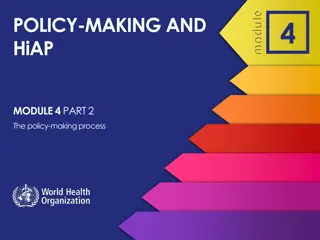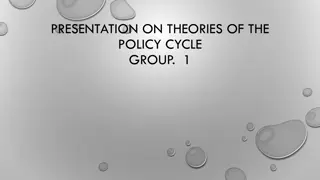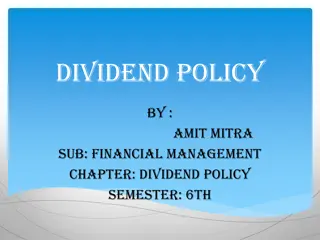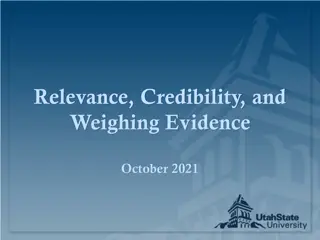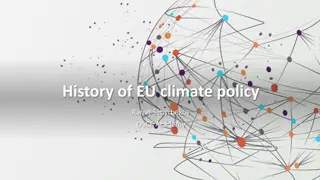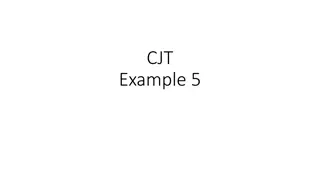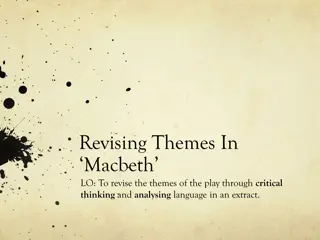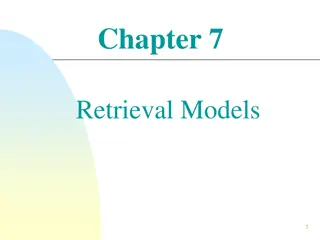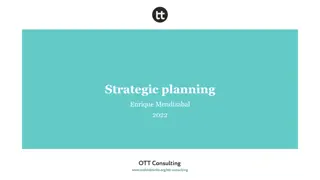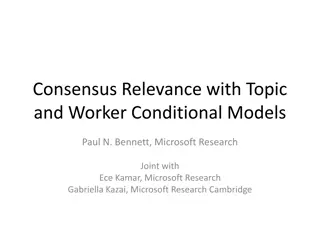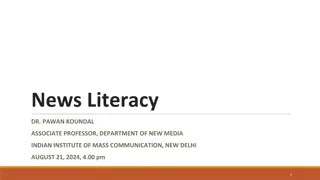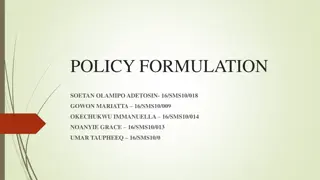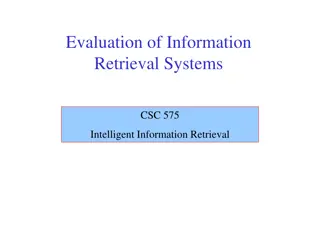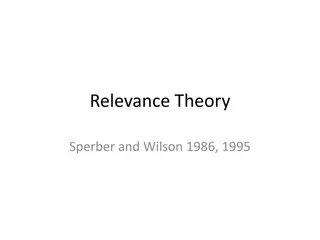Decolonising Approach to Policy Impact: Lessons for Research Culture
Engaging with policy in Global South countries and addressing power imbalances and historical complexities is crucial in policy impact and research culture. The Institute for Policy and Engagement at the University of Nottingham focuses on decolonising policies and research practices to promote equi
0 views • 19 slides
Relevance of Countercyclical Fiscal Policy and Fiscal Acyclicality
This literature review examines the effectiveness of countercyclical fiscal policies in stabilizing output and enhancing welfare, with a focus on the correlation between public spending cycles and GDP cycles. The study analyzes examples from Sweden and Argentina to showcase the impact of fiscal poli
2 views • 29 slides
Practical Guide to Writing Policy Briefs for Research Engagement with Policy Makers
Effective communication with policy makers is essential for influencing policy decisions. This practical guide offers advice on creating high-quality policy briefs based on research evidence, providing tools and indicators to measure impact.
0 views • 15 slides
Gender Equity and Social Inclusion Policy Overview
This overview highlights the Gender Equity and Social Inclusion (GESI) Policy promoted by the Department of Personnel Management in Papua New Guinea. The policy aims to ensure fair participation of disadvantaged individuals in employment and opportunities, along with social inclusion to realize the
1 views • 18 slides
Enhancing Policy Coherence for Sustainable City Development
Supporting policymaker discussions on policy relevance and coherence is crucial for addressing high-level societal needs and demands in cities. This involves analyzing the impacts, synergies, and conflicts of policy instruments, ensuring vertical and horizontal coherence, and identifying knowledge g
5 views • 18 slides
Understanding Policy-Making Process for Health Improvement
Policy-making involves defining policy, recognizing its complex nature, identifying windows of opportunity, and framing health issues. The policy-making cycle includes stages like agenda setting, formulation, and implementation. Alignment of problems, policies, and politics is crucial for effective
1 views • 12 slides
Understanding Gramsci's Political Theory and its Relevance Today
Gramsci's political theory, focusing on concepts such as hegemony, historical bloc, and the role of intellectuals, offers valuable insights into contemporary political challenges. Explored through the lenses of Prof. Ken Spours and Stuart Hall's analytical tradition, this analysis sheds light on Con
0 views • 13 slides
Effective Writing and Policy Briefs: Enhancing Impact in Policy-making
A policy brief is a compelling document designed to influence decision-makers by outlining policy alternatives and courses of action. Discover the value of policy briefs, effective characteristics, and strategies for agenda setting and policy formulation in this comprehensive module.
1 views • 22 slides
Understanding Theories of the Policy Cycle in Policy Analysis
The policy cycle theory describes the evolution of policy issues from inception to evaluation, impacting scientific research and policy formulation. It outlines stages from the 1950s, influenced by Lasswell's seven-stage model, serving as a framework for organizing policy processes. Despite the line
3 views • 30 slides
Understanding Dividend Policy in Financial Management
Dividend policy in financial management involves decisions regarding the distribution of earnings to shareholders and retained earnings. It includes types of dividends, time of payment, and dimensions impacting the policy. Various dividend theories like Modigliani and Miller's Model, Walter's Model,
0 views • 34 slides
Mastering the CRAAP Test for Evaluating Information Online
Understand the importance of evaluating online information using the CRAAP Test. Developed by the Meriam Library at California State University Chico, this test focuses on Currency, Relevance, Authority, Accuracy, and Purpose. Learn to assess the timeliness, reliability, and relevance of sources to
2 views • 57 slides
Relevance and Limitations of Marx's Capital in Modern Social Theory
Exploring the ongoing relevance of Marx's Capital in contemporary social theory, Gary Herrigel from the Department of Political Science discusses its implications and theoretical considerations. Despite its foundational role, Marx's work also faces practical limitations, such as the challenge of tra
3 views • 14 slides
Exploring Attention and Relevance in English PhD Research
Delve into the dynamics of attention and relevance within English research through a comprehensive and structured exploration. Uncover the impact, originality, and unique value of your study amidst existing literature, ultimately aiming to contribute meaningfully to the field. Embrace the challenges
0 views • 11 slides
Global Relevance and Redundancy Optimization in Multi-label Feature Selection
The study focuses on optimizing multi-label feature selection by balancing global relevance and redundancy factors, aiming to enhance the efficiency and accuracy of data analysis. It delves into the challenges posed by information theoretical-based methods and offers insights on overcoming limitatio
0 views • 15 slides
Understanding Relevance, Credibility, and Weighing Evidence in Decision-Making
Explore the importance of relevance and credibility in evidence assessment, the role of hearing panels in evaluating evidence fairly, and the responsibilities they hold. Learn about presenting relevant evidence, policy analysis, and identifying irrelevant evidence to ensure a thorough review process
6 views • 32 slides
Enhancing Curriculum Relevance and Student Engagement in Higher Education
Reviewing and updating academic programmes to ensure curriculum relevance, active student engagement, appropriate assessment strategies, and effective use of technology to support learning. Considerations include international competition, student diversity, technological advancements, student feedb
1 views • 34 slides
Challenges in Policy Implementation and Lessons Learned
The content discusses the challenges faced in policy implementation, focusing on the gap between policy design and execution. It highlights key steps in policy-making, reasons for implementation failures, and factors influencing successful policy outcomes. Examples from Zambia's National Science and
0 views • 14 slides
Evolution of EU Climate Policy: A Historical Perspective
The history of EU climate policy can be traced back to the 1970s when concerns about global climate change started gaining policy relevance. The 1980s saw increased awareness and the EU's involvement in environmental matters, leading to the adoption of the Single European Act in 1987. In the early 1
0 views • 18 slides
Understanding Evidence Gathering for VA Claims with The American Legion Department of Ohio
Evidence is crucial for VA claims, and it can come in various forms such as documents, written statements, photos, and video recordings. The framework for evaluating evidence includes factors like relevance, competence, credibility, and weight. Understanding the types of evidence, forms of relevance
0 views • 14 slides
Understanding Relevance Rules in Legal Testimony
Relevant testimony in a legal case is crucial as it can impact the probability of important facts. However, objections related to probative value, unfair prejudice, and confusion of issues can lead to exclusion of evidence or testimony. Unfair prejudice specifically applies to defendants, while char
0 views • 26 slides
Understanding Hearsay Rules and Exceptions in Legal Proceedings
Hearsay evidence, which is an out-of-court statement introduced for the truth of its content, is considered less reliable in court due to factors like lack of oath, inability to see demeanour of declarant, and absence of cross-examination. Various historical judgments and legal exceptions allow cert
0 views • 90 slides
Clinical Judgement Test: Research Question Relevance and Study Design Assessment
This document presents a Clinical Judgement Test focusing on the relevance of a research question and the appropriateness of the study design. Candidates are evaluated on their critical review skills and ability to assess both strengths and weaknesses of the research methodology employed. The test a
0 views • 12 slides
Evaluation of PNIN Phase I: Preliminary Results and Research Questions
This article discusses the evaluation of Phase I of the PNIN project, focusing on relevance, coherence, efficacy, impact, and sustainability. It explores the approach, methodology, research questions, and revised Theory of Change. The study aims to assess the performance of PNIN, potential changes n
0 views • 17 slides
Exploring Themes in Shakespeare's Macbeth: Critical Analysis and Reflection
Delve into the themes of blood, night, and sleep in Shakespeare's Macbeth through critical thinking and language analysis. Understand the significance of these recurring words in the play, ponder on the universal themes presented, and consider the contextual relevance of Shakespeare's thematic explo
0 views • 16 slides
Privacy Risks and Opportunities in Big Data for Development
Big data presents both risks and opportunities for development initiatives, with the potential to enhance policy-making processes. While big data can improve the efficiency of public policy and administration, concerns arise regarding data accuracy, inclusivity, and transparency. Upholding privacy p
0 views • 17 slides
Understanding Retrieval Models in Information Retrieval
Retrieval models play a crucial role in defining the search process, with various assumptions and ranking algorithms. Relevance, a complex concept, is central to these models, though subject to disagreement. An overview of different retrieval models like Boolean, Vector Space, and Probabilistic Mode
0 views • 56 slides
Theories and Strategies for Effective Policy Change
Explore the intricacies of strategic planning, outcome mapping, change theories, policy windows, and more in the realm of policy entrepreneurship and advocacy. Learn about key concepts such as large leaps theory, policy streams theory, and how think tanks can influence policy decision-making process
0 views • 43 slides
Consensus Relevance with Topic and Worker Models
Study focuses on recovering actual relevance of a topic-document pair using noisy predictions from multiple labelers. Various supervised, semi-supervised, and unsupervised approaches are explored. The goal is to obtain a more reliable signal from the crowd or benefit from scale through expert qualit
0 views • 15 slides
Morality in UK Drug Policy: Policy Constellations Analysis
Morality plays a significant role in shaping drug policy in the UK, as revealed by the research conducted by Professor Alex Stevens at the University of Kent. The study investigates the moral commitments underlying different policy positions in UK drug policy debates, highlighting five ethico-politi
0 views • 19 slides
Reevaluating the Relevance of Christians in Today's Secular Society
The presentation explores the diminishing relevance of Christians in contemporary society, attributing it to sentimental attachment and the legacy of Constantinianism. It delves into the concept of the Church as "unchurch" and challenges the traditional notions of Christian influence. The evolving r
0 views • 15 slides
Travel Policy Changes at Pittsburg State University
Pittsburg State University is implementing new travel policy changes effective January 1, 2016, aligning with federal standards for per diem rates. The changes are a result of the State of Kansas adopting federal rates and will impact all travel occurring after the specified date. The policy update
0 views • 21 slides
Transforming ChildFund: Solving Brand Challenges in Advocacy Sector
ChildFund, facing challenges as an undifferentiated brand in a competitive advocacy sector, is focusing on distinctiveness, relevance, trust, pervasiveness, and consistency in brand development. By emphasizing relevance and brand attributes, they aim to increase grants, partnerships, and fundraising
1 views • 26 slides
Industrial Policy: The Old and The New - Insights by Dani Rodrik
Industrial policy, as presented by Dani Rodrik in May 2019, emphasizes the importance of empirical work, the differences between old and new policies, and the targets industrial policy should focus on. The theoretical arguments for industrial policy highlight market imperfections, learning spillover
0 views • 26 slides
Privacy and New Technologies: Questions on Personal Data Relevance and Regulation
Explore the relevance of personal data in today's technology-driven world, questioning its impact on privacy and regulation. Delve into the challenges of regulating data gathering, access, and usage while considering the evolving landscape of privacy responsibilities in product development.
0 views • 9 slides
Biologically Important Evening Element in Promoter Regions: Insights from Research by Leila Shokat
The research explores the significance of the Evening Element as a motif in gene promoter regions regulated by CCA1. Understanding the importance of motif positions in promoters reveals insights into gene regulation and biological relevance. The study highlights the relevance of consistent motif pos
0 views • 6 slides
Understanding the Characteristics of News and News Literacy
News plays a vital role in informing, shaping opinions, and influencing decision-making. This article explores the characteristics of news including objectivity, timeliness, relevance, proximity, and impact. Objectivity ensures unbiased reporting, timeliness focuses on recent events, relevance targe
0 views • 35 slides
Understanding Policy Formulation: Key Concepts and Approaches
Policy formulation is a crucial step in the policy-making process, involving identifying and crafting policy alternatives to address various issues. This phase requires participants to define policy problems, develop alternatives, and select the most feasible solutions based on criteria such as feas
0 views • 12 slides
Evaluation of Information Retrieval Systems and User Satisfaction
Information Retrieval Systems are evaluated based on aspects like query assistance, speed, resources, and relevancy. Measuring user satisfaction often relies on the relevance of search results, which requires benchmark collections, query suites, and binary relevance assessments. Human-labeled corpor
0 views • 24 slides
Understanding Relevance Theory: Sperber and Wilson's Approach
Relevance Theory, introduced by Sperber and Wilson in 1986, aims to explain how propositions are understood without relying on mutual knowledge. It addresses deixis, ellipsis, vagueness, and ambiguity while exploring implicatures and providing a general theory of communication beyond just verbal int
0 views • 38 slides
Teaching Student Teachers for Relevance & Integration
Explore how teachers can integrate curriculum around big ideas and key values to teach for relevance. Learn about the findings of a longitudinal study on teacher practices and the importance of balancing traditional content with real-world understanding. Discover the significance of integrating teac
0 views • 18 slides





